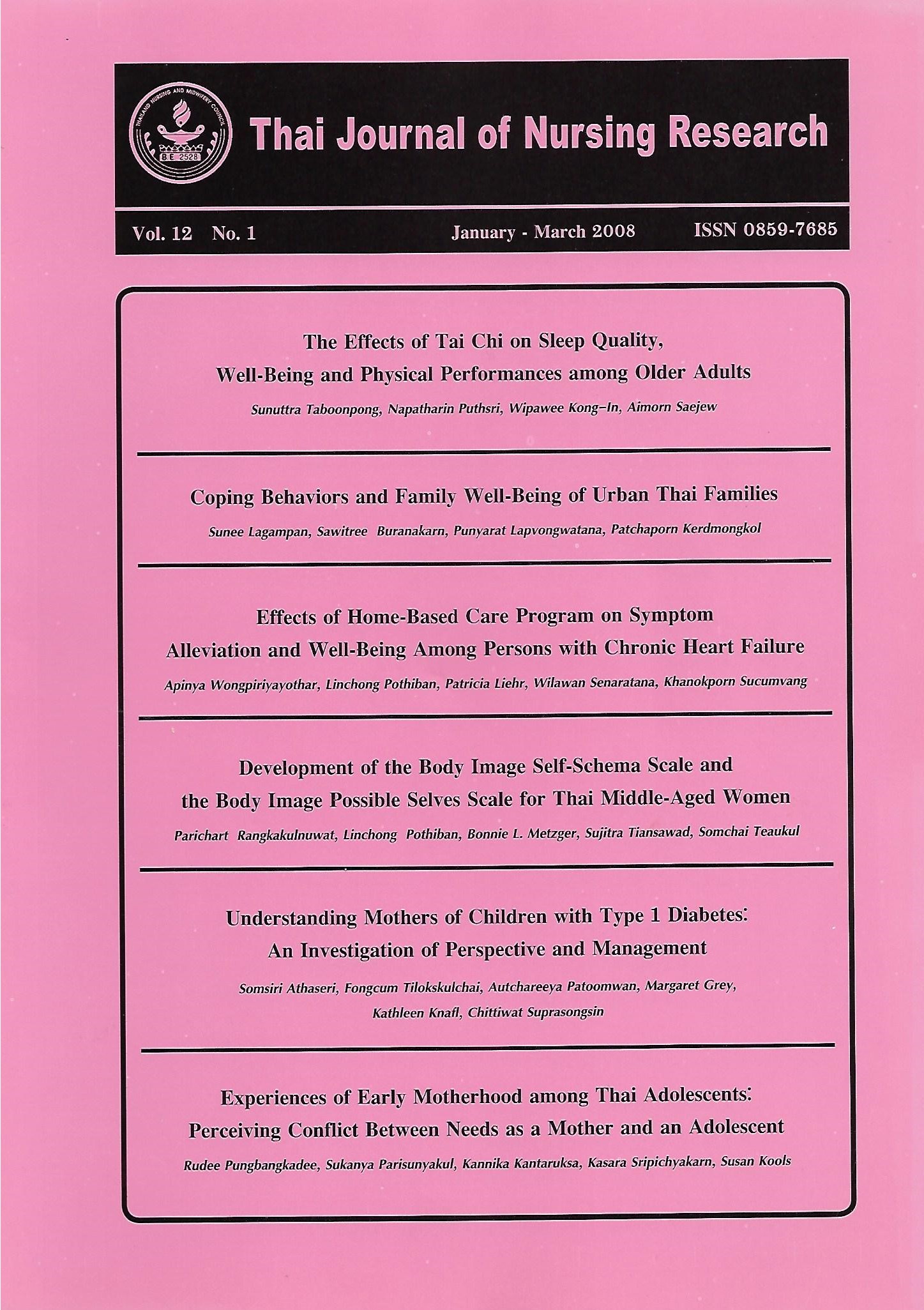Experiences of Early Motherhood among Thai Adolescents: Perceiving Conflict Between Needs as a Mother and an Adolescent
Keywords:
ความต้องการที่ขัดแย้ง, การเป็นมารดาในระยะแรก, การสร้างทฤษฎีจากข้อมูล, พื้นฐานเด็กวัยรุ่นไทย, conflicting needs, early motherhood, grounded theory, Thai adolescentsAbstract
มารดาวัยรุ่นถือว่ามีความเสี่ยงสูงในการเป็นมารดา เนื่องจากขาดวุฒิภาวะทางจิตใจ และมีความต้องการตามพัฒนาการของตนเองซึ่งอาจขัดแย้งกับความต้องการของบุตร การรับรู้ และการให้ความหมายเกี่ยวกับการเป็นมารดาของมารดาวัยรุ่น เป็นตัวกำหนดกลยุทธ์ในการอยู่กับความขัดแย้ง วัตถุประสงค์ของการวิจัยเซิงคุณภาพนี้เพื่อเข้าใจการพัฒนาบทบาทการเป็น มารดาในระยะแรกของเด็กวัยรุ่นไทย ผู้เข้าร่วมวิจัยเป็นมารดาวัยรุ่นครรภ์แรกที่มีสามีอยู่ด้วย จำนวน 21 ราย ที่มารับบริการที่คลินิกเด็กดี ณ ศูนย์บริการสาธารณสุขและโรงพยาบาลใน กรุงเทพมหานคร การเก็บข้อมูลและการวิเคราะห์กระทำตามแนวทางวิจัยของการสร้างทฤษฎีจากข้อมูลพื้นฐาน ผู้วิจัยเก็บรวบรวมข้อมูลและวิเคราะห์ข้อมูลไปพร้อมๆ กัน ในช่วงเดือนสิงหาคม 2547 ถึงเดือนธันวาคม 2548 เก็บข้อมูลโดยการสัมภาษณ์เชิงลึกมากกว่าหนึ่งครั้ง ร่วมกับการสังเกตการณ์แบบมีส่วนร่วม ผลการศึกษาพบว่า “การอยู่กับความขัดแย้งระหว่างความต้องการในฐานะที่เป็นมารดาและความต้องการของวัยรุ่น” เป็นประเด็นหลักของกระบวนการพัฒนาบทบาทการเป็นมารดาในระยะแรก โดย “การรับรูถึงความต้องการที่ขัดแย้ง” ซึ่งประกอบด้วยการรับรู้ ความขัดแย้งระหว่างการมุ่งเน้นที่เด็กและการมุ่งเน้นที่ตัวเอง การรับรู้ความขัดแย้งระหว่างการเลี้ยงบุตรและความต้องการไปโรงเรียนหรือทำงาน การรับรู้ความขัดแย้งระหว่างการห่วงภาพ ลักษณการเป็นมารดาและภาพลักษณ์ของตัวเอง และการรับรู้ความขัดแย้งระหว่างการพึ่งพา ครอบครัวและการเป็นอิสระจากครอบครัวเป็นสาเหตุทำให้มารดาวัยรุ่นค้นหากลยุทธ์ในการอยู่ กับความขัดแย้งระหว่างความต้องการทั้งสองนั้น ดังนั้นบุคลากรทางสุขภาพควรไวต่อการรับรู้ถึง ความขัดแย้งระหว่างความต้องการทั้งสองของมารดาวัยรุ่น เพื่อสามารถส่งเสริมให้ใช้กลยุทธในการอยู่กับความขัดแย้งได้อย่างเหมาะสม นำไปสู่การมีประสบการณ์การเป็นมารดาในทางบวกและ เกิดผลลัพธ์ที่ดีทั้งต่อมารดาวัยรุ่นและบุตรต่อไป
Adolescent mothers are considered to be at high risk of becoming mothers because of psychological immaturity, and their own normal development needs that may conflict with the needs of their child. Adolescents’ perception and meaning of motherhood determine their strategies to live with conflicting needs. The purpose of this qualitative study was to understand the experiences of early motherhood among Thai adolescents who had a child ages less than 6 months. Participants were 21 adolescent mothers who attended at well baby clinics of the Health Centers 49, Taksin Hospital, and Siriraj Hospital. Data collection and analysis were guided by grounded theory approach. The data collection and analysis occurred simultaneously during August 2004 to December 2005. Data were collected by multiple in-depth interviews and participant observation. The findings demonstrated that “living with conflict between needs as a mother and an adolescent,” was a core category of the process in developing early motherhood. Four ‘perceiving conflicting needs’ which included perceiving conflict between focusing on the child and the self, perceiving conflict between taking care of the child and desiring to go to school or work, perceiving conflict between concerning maternal images and self-images, and perceiving conflict between interdependence with family and independence from family, was emerged and identified as the causal condition that led adolescent mothers to use strategies for living with conflicting needs. These findings recommended that health care providers need to be more sensitive to adolescents’ perceiving conflicting needs in order to promote using appropriate strategies leading to positive experience of motherhood and positive mother-child outcomes.
References
2. Cash K, Anasuchatkul B, Busayawong W. Understanding the psychological aspects of HIV/AIDS prevention for northern Thailand single adolescent migratory women workers. Journal of Applied Psychology. 1999; 48(2):125-137.
3. Chuprapawan C. Health status of Thai people in 2000. Institute of Public Health System Research. Bangkok: Mochoban, 2000.
4. Bobak IM, Jensen MD. Maternity & Gynecologic care: The nurse and the family. 5th ed. St.Louis: Mosby, 1993.
5. Lowenthal B, Lowenthal R. Teenage parenting: Challenges, interventions and programs. Childhood Education. 1997; 74: 29-32.
6. Wong DL, Perry SE. Maternal child nursing care. St.Louis: Mosby, 1998.
7. Koniak-Griffin D. Maternal role attainment. IMAGE: Journal of Nursing Scholarship. 1993; 25(3): 257-262.
8. Pungbangkadee R. Motherhood experiences from the perspective of Thai adolescent mothers: a pilot study. Unpublished manuscript, 2003.
9. Morse JM, Field PA. Nursing research: the application of qualitative approaches. 2nd ed. London: Chapman &Hall, 1996.
10. Rubin R. Attainment of the maternal role. Part II: models and referents. Nursing Research. 1967; 16: 324-346.
11. Holloway I, Wheeler S. Qualitative research of nurses. Cambridge, MA: Blackwell Science, 1996.
12. Strauss A, Corbin J. Basic of qualitative analysis: grounded theory procedures and techniques. Newbury Park, CA: Sage, 1990.
13. Schreiber R, Stern PN. Using Grounded Theory in Nursing. New York: Springer Publishing Company, 2001.
14. Charmaz K. Grounded theory. In Smith J, ed. Qualitative Psychology. London: SAGE, 2001.
15. Steinberg L. Adolescence. 5th ed. New York: McGraw-Hall, 1999.
16. Mercer RT. The process of maternal role attainment over the first year. Nursing Research. 1985; 34: 198-204.
17. Mercer RT. First-time motherhood: experiences from teens to forties. New York: Springer Publishing Company, 1986.
18. Thato S, Rachukul S, Sopajaree C. (2005) Obstetrics and perinatal outcomes of Thai pregnant adolescents: A retrospective study. Available at: https://www.sciencedirect.com. Accessed November 25, 2006.
19. Sadler LS, Catrone C. The adolescent parents: A dual developmental crisis. Journal of Adolescent Health Care.
1983; 4: 100-105.
20. Sadler LS. Adolescent parents. In Margaret -Ann C, Jerrilyn M, eds. The adolescent and pregnancy. Boston: Blackwell Scientific Publication. 1987: 231-248.
21. Office of Womanûs Affairs and Family Development Ministry of Social Development and Human Security. Report on Thai family situation. Bangkok: Author, 2547.
Downloads
How to Cite
Issue
Section
License
Copyright: The Pacific Rim International Journal of Nursing Research, Thailand Nursing & Midwifery Council has exclusive rights to publish, reproduce and distribute the manuscript and all contents therein.








.png)



